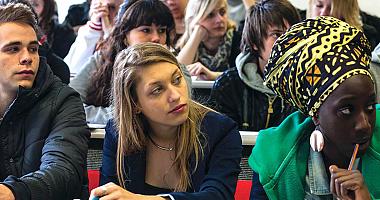BA (Hons)
Social & Community Work
Content navigation menu
Why study BA Social & Community Work at Goldsmiths
Combine the academic study of social sciences with the opportunity to apply your newfound skills and knowledge in the real world.
- You will study everything from criminology to mental health, youth work, and community development. You can also specialise in your areas of interest, such as youth justice, global youth work or international development.
- The degree is responsive to changes in the wider political and policy context, and places emphasis on working with communities in ways which empower them to understand and address the contradictory implications.
- Learn to critically engage with policy, particularly as it affects vulnerable people from a wide range of social, cultural, and economic backgrounds.
- You will have opportunities for vocational experience and a foundation in a range of employment fields - the housing sector, mental health services, criminal justice, community development, working with young people and management responsibilities in the social and public sectors.
- It will equip you to work with people in a range of contexts or to qualify in your chosen field of interest at postgraduate level.
- You will consider a range of issues including race and racism, disability, and LGBT discrimination, among others.
- You will be challenged to learn about yourself and develop into a self-reflexive professional worker.
Contact the department
If you have specific questions about the degree, contact Andy Turner.
UCAS code
L541
Entry requirements
A-level: CC
BTEC: MPP
IB: Successful completion
Length
3 years full-time
Fees
Home - full-time: £9250
International - full-time: £19640
Department
What you'll study
In the first year you take the following modules:
| Module title | Credits |
|---|---|
| Introduction to Social Work, Community Development, and Youth Work | 15 credits |
| Group Work | 15 credits |
| Introduction to Applied Social Science Research | 15 credits |
| Introduction to Social Science | 15 credits |
| Race, Racism and Professional Practice | 15 credits |
| Criminology, Law and Rights | 15 credits |
| Foundation to Social Work | 15 credits |
| Identity, Agency & Environment 2 | 15 credits |
Note about optional modules (if available): The above is indicative of the typical modules offered, but is not intended to be construed or relied on as a definitive list of what might be available in any given year. The module content and availability is subject to change.
How you'll be assessed
The programme offers a balance between practical and academic work. It is responsive to changes in the wider political and policy context, and places emphasis on working with communities in ways which empower them to understand and address the contradictory implications.
Examined work includes essays, written reports, self assessments, seminar and workshop presentations, self-directed projects and work experience.
Teaching style
This programme is mainly taught through scheduled learning - a mixture of lectures, seminars and workshops. The curriculum draws on a wide range of intellectual resources, academic disciplines, and teaching methods, and will help you to develop the skills needed to work in different settings and organisations. You'll engage in group work and participative learning, which will allow you to practice and apply what you learn in a very real sense with tutors and other students.
You’ll also be expected to undertake a significant amount of independent study. This includes carrying out required and additional reading, preparing topics for discussion, and producing essays or project work.
Entry requirements
We accept the following qualifications:
A-level: CC
BTEC: MPP
International Baccalaureate: Successful completion
If you can't find your qualification here, then please visit our entry requirements page for a list of alternative qualifications.
Alternative qualifications
See our full list of undergraduate entry qualifications.
We welcome students with a range of educational experiences. If you believe you may not meet the standard qualification requirements we would still encourage you to apply because we consider all aspects of your application when making a decision.
We’ll pay particularly careful attention to your personal statement, which is your opportunity to demonstrate your interest in the subject you’ve applied for. Your referees are also welcome to include any relevant contextual comments around your academic achievements. We’ll look at all these things when making a decision on your application, as well as your qualifications and grades.
International qualifications
We also accept a wide range of international qualifications. Find out more about the qualifications we accept from around the world.
If English isn’t your first language, you will need an IELTS score (or equivalent English language qualification) of 6.0 no element lower than 5.5 to study this programme. If you need assistance with your English language, we offer a range of courses that can help prepare you for degree-level study.
Fees and funding
Annual tuition fees
These are the UG fees for students starting their programme in the 2024/2025 academic year.
- Home - full-time: £9250
- International - full-time: £19640
If your fees are not listed here, please check our undergraduate fees guidance or contact the Fees Office, who can also advise you about how to pay your fees.
It’s not currently possible for international students to study part-time if you require a Student Visa, however this is currently being reviewed and will be confirmed in the new year. Please read our visa guidance in the interim for more information. If you think you might be eligible to study part-time while being on another visa type, please contact our Admissions Team for more information.
If you are looking to pay your fees please see our guide to making a payment.
Funding opportunities
We offer a wide range of scholarships and bursaries, and our Careers Service can also offer advice on finding work during your studies. Find out more about funding your studies with us.
Additional costs
In addition to your tuition fees, you'll be responsible for any additional costs associated with your course, such as buying stationery and paying for photocopying. You can find out more about what you need to budget for on our study costs page.
There may also be specific additional costs associated with your programme. This can include things like paying for field trips or specialist materials for your assignments. Please check the programme specification for more information.
Careers
This programme will give you a strong foundation for moving into a career in the public and social professions, and the charity sector. You will be given a broad introduction to work with young people and communities without restricting to a career and combine academic study with placements in professional practice to equip you for your chosen profession.
The programme is also a gateway into social work, youth work, community work, other social care and public professions.
Postgraduate study
You will be well equipped to work with people in a range of contexts or to qualify in your chosen field of interest at MA level. The Department of Social, Therapeutic and Community Studies (STaCS) offers a guaranteed interview for all graduates of this programme who meet the entry requirements for selected MA programmes in Community Development, Youth Work, and a range of Counselling and Therapies programmes.
Find out more about employability at Goldsmiths.
Who will teach you
The following staff teach on this programme.
- David Woodger
- Dr Naomi Thompson
- Andy Turner
- Susan Westman
- Angelo Piccigallo
- Dr Pearson Nkhoma
- Dr Magna Aidoo
- Natalie Law
- Lara Paquete Pereira




